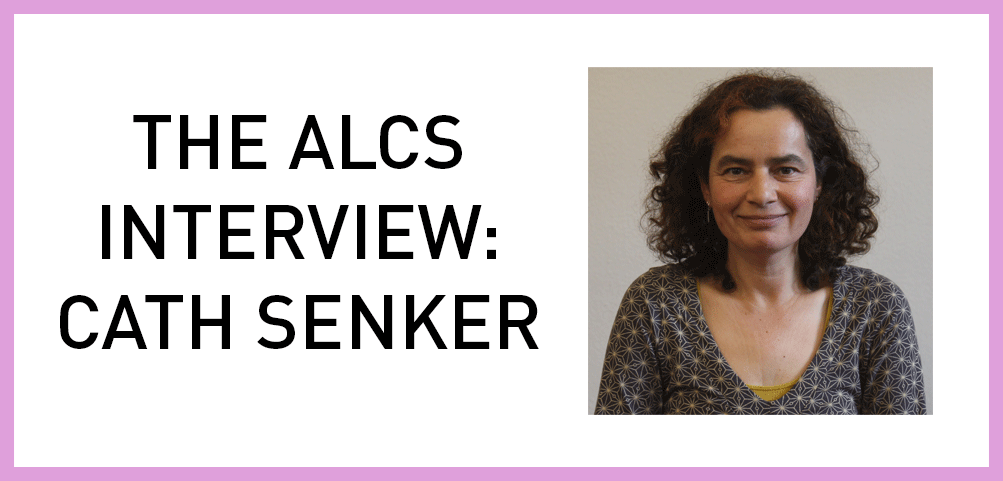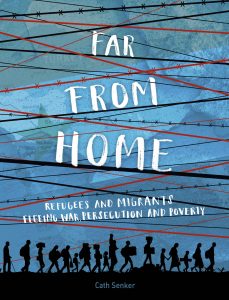
THE ALCS INTERVIEW: Cath Senker
We talk to the author of Far From Home, worthy winner of this year’s Educational Writers’ Award.
Earlier this month at the All Party Writers Group winter reception at the House of Commons, Tom Watson MP, deputy leader of the Labour Party and Shadow Culture Secretary announced Cath Senker’s Far From Home: Refugees and Migrants Fleeing War, Persecution and Poverty as the winner of the 2018 Educational Writers’ Award. Westminster provided a particularly appropriate setting in which to celebrate a highly topical book which sensitively examines the root causes of mass migrations of people in the 21st century for readers of secondary school age.
The plight of refugees and migrants is an issue that has long preoccupied the book’s author Cath Senker; herself the descendent of Jewish refugees who came to Britain to escape from pogroms in Eastern Europe. A freelance writer since 2000, she has over 160 books for children of all ages to her name, from history, biography, global and social issues to world religions, human geography and environmental topics.
I think it’s a cornerstone of writing educational books that you give children the information they need to think about a topic so they can make up their own minds.
When we chat on the phone a few days after the announcement of her win, Cath tells me that Far From Home is based on extensive research with refugees, including her own experience as a volunteer for Brighton-based Migrant English Project. It provides free and informal English lessons for asylum seekers, refugees and migrants, along with support, basic advice, referrals and signposting when needed, and an all-important sense of community. “I also talked to people on the ground via the Hummingbird Project which at the time was working with young unaccompanied minors in the Jungle in Calais, offering support and a safe space to be. They kindly provided some of the case studies that appear in the book, including that of fourteen-year-old Abdul who is sadly still stuck in France.”
 Achieving a balanced perspective on what can be a divisive issue was of paramount importance to Cath in writing the book. “I thought it was very important to remember that British people are also migrants to other countries, so I’ve included a case study about some friends in Spain – a British and American couple who migrated to Seville and have brought up their family there so they have this triple culture.” And indeed the judges of the Educational Writers’ Award praised Far From Home for providing “a clear and compassionate catalyst for discussions about the plight of refugees”, and for “presenting different viewpoints in an impeccably non-judgemental way”.
Achieving a balanced perspective on what can be a divisive issue was of paramount importance to Cath in writing the book. “I thought it was very important to remember that British people are also migrants to other countries, so I’ve included a case study about some friends in Spain – a British and American couple who migrated to Seville and have brought up their family there so they have this triple culture.” And indeed the judges of the Educational Writers’ Award praised Far From Home for providing “a clear and compassionate catalyst for discussions about the plight of refugees”, and for “presenting different viewpoints in an impeccably non-judgemental way”.
How does Cath go about striking the right tone in books written specifically for a secondary school audience? “I was absolutely delighted when the judges said they found Far From Home to be non-judgemental because that’s what I always aim for in my writing. I think it’s a cornerstone of writing educational books that you give children the information they need to think about a topic so they can make up their own minds. So with Far From Home, it was important to include the fact that there have been negative as well as positive reactions to refugees. I needed to explain why people might not always be welcoming, and the political issues behind such attitudes.”
In the light of the key findings from ALCS’ latest research into writers’ incomes, I ask Cath if it has become more difficult to earn a living as an educational writer? “Yes absolutely it has: the proportion of my income that comes from writing has gone down over the years. I’ve had to diversify, and I now do some teaching as well as editing and proofreading. Most writers I know are in the same position. I’m constantly amazed that writers I assume to be pretty well-established in their writing careers are all doing other jobs as well. Personally I’m happy to work in other areas, but it is extraordinarily difficult now for writers who want to make a full-time living from their writing.”
The proportion of my income that comes from writing has gone down over the years. I’ve had to diversify, and I now do some teaching as well as editing and proofreading.
As the Educational Writers’ Award highlights, the job of an educational writer is nevertheless a vital one: there is no substitute for good quality books as a learning tool in schools. But is it also a rewarding job? “Yes! I love doing the research – I’m always excited when I receive a new commission because it’s a wonderful spur to my own learning. In order to write for children you have to really understand what you’re writing about because you’ve then got to simplify it and make it clear. I very much enjoy that part of it.” Cath is currently writing an adult non-fiction book on the kings and queens of Britain, a topic she tells me “is way outside my comfort zone! I’m also hoping to be able to write some more books about refugees for the primary age group in the near future”.
Cath is donating the £2,000 prize money she received for winning the Educational Writers’ Award to some of the refugee causes featured in Far From Home which will be published in an updated paperback edition in April 2019. “Naturally I wanted to share the money between some of the organisations that helped me with the book, including the Hummingbird Project in Brighton, and I also wanted to help those organisations that work with children, such as the School Bus Project which offers mobile learning provision for refugees. So I greatly appreciate the generosity of ALCS in donating such a large cash prize for the Award.”
Interview by Caroline Sanderson, author, freelance books journalist and editor of ALCS News.
Photograph © Kona Macphee
